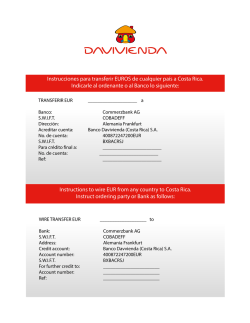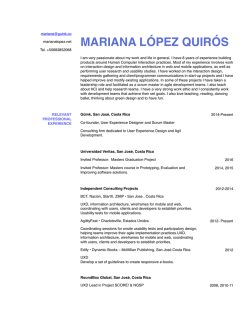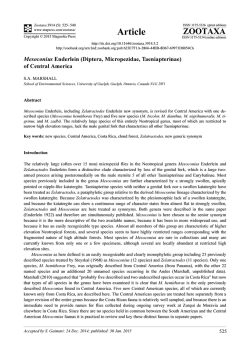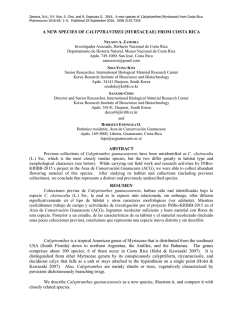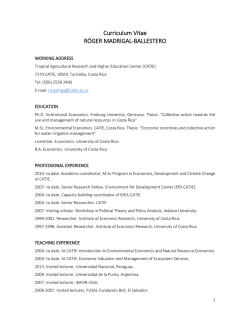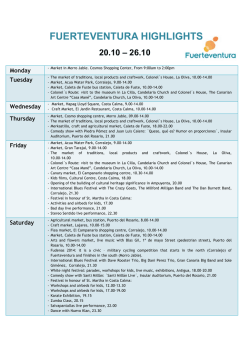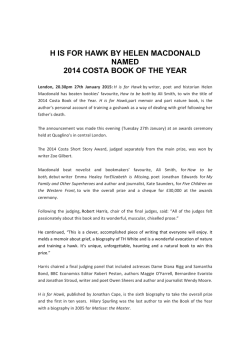
CURRICULUM VITAE Name / gender: Ignacio Escalante Meza
CURRICULUM VITAE updated: 05-10-2015 Name / gender: Ignacio Escalante Meza / male Email: [email protected], phone numbers: 510 701 9670 (US); and 506 89236704 (Costa Rica). Mailing address: 140 Mulford Hall. Berkeley, California, USA. 94720-3114. Personal research website: http://iescalante.weebly.com/ Personal data Date and place of birth: 18 August, 1986, San José, Costa Rica. Physical address: 618 Lexington Ave, Apt 1. El Cerrito, California, USA. 94530 Academic studies Undergraduate studies: - Biology, B.S. School of Biology, University of Costa Rica. San José, Costa Rica. 20042008. Graduate studies: - Master’s program in Biology, graduated with honors, University of Costa Rica. 2009– 2012. Subject: Ontogeny of the feeding behavior in the spider Physocyclus globosus (Pholcidae): Effect of experience or maturation? William G. Eberhard, PhD: advisor. - PhD program. Department of Environmental Science, Policy, and Management. University of California Berkeley. August 2014 – present. Damian O. Elias, PhD: Advisor. Partial Support through the Fulbright Graduate Fellowship Program. Foreign languages: fluent written and spoken English (TOEFL-iBT score 105). Good reading and listening of Portuguese. Area of professional specialization Behavioral ecology research and university level teaching. Research interests Animal behavior & tropical ecology. Emphasis on arachnids. Behavior, grouping and reproductive ecology of Opiliones. Spider learning, web construction, and their reproductive behavior. Bird behavioral ecology: nesting, reproduction and sound communication. Peer-reviewed publications Escalante, I. & L. Sandoval. 2007. Primeros registros del Piquero Patirrojo (Sula sula) en las costas del Pacífico Norte y el Caribe de Costa Rica. Boletín Sociedad Antioqueña de Ornitología 17:138-140. URL: http://www.sao.org.co/publicaciones/boletinsao/NC1_XVII(2)_2007.pdf Sandoval, L. & I. Escalante. 2010. Nest description of the Garden Emerald (Chlorostilbon assimilis) from Costa Rica. Wilson Journal of Ornithology 122: 597-599. URL: http://www.researchgate.net/publication/230562590_Nest_Description_of_the_Garden_Em erald_(Chlorostilbon_assimilis)_from_Costa_Rica/file/79e415018063325e6d.pdf Moya, J., R. Quesada, W. Eberhard, G. Barrantes, I. Escalante, C. Esquivel, A. Rojas, E. Triana y A. Arias. 2010. Egg sac construction by folding dead leaves in Pozonia nigroventris and Micrathena sp. (Araneae, Araneidae). Journal of Arachnology 38: 371-373. URL: http://www.americanarachnology.org/JoA_free/JoA_v38_n2/arac-38-02-371.pdf Sandoval, L. & I. Escalante. 2011. Song variation and spatial similarity in males of the Common Pauraquee (Nyctidromus albicolliis). Ornitología Neotropical 22:173-185. URL: http://www.researchgate.net/publication/230562594_SONG_DESCRIPTION_AND_INDI VIDUAL_VARIATION_IN_MALES_OF_THE_COMMON_PAURAQUE_(NYCTIDRO MUS_ALBICOLLIS)/file/79e415018068866968.pdf. Clark, C. J., T. J. Feo & I. Escalante. 2011. Courtship display and natural history of the Scintillant (Selasphorus scintilla) and Volcano (S. flammula) Hummingbirds. Wilson Journal of Ornithology 123: 218-228. URL: http://www.wjoonline.org/doi/abs/10.1676/10-076.1 Esquivel, C., I. Escalante & W.G. Eberhard. 2012. The effect of regurgitated digestive fluid on the spider`s own legs in Philoponella vicina (Araneae: Uloboridae). Journal of Arachnology 40: 146-148. URL: http://www.americanarachnology.org/JoA_free/JoA_v40_n1/arac-40-1-146.pdf. Escalante, I. 2013a. Ontogenetic and sexual differences in exploration and web construction in the spider Physocyclus globosus (Pholcidae). Arachnology 16: 61-67. URL: http://wiki.britishspiders.org.uk/index.php5?title=Arachnology_Volume_16 Escalante, I. 2013b. Comportamiento de canto, descripción de las vocalizaciones y su posible variación geográfica en Costa Rica en Myiothlypis fulvicauda (Parulidae: Aves). Zeledonia 17: 35-53. URL: http://www.avesdecostarica.org/006Escal.pdf Escalante, I. 2013c. Protected nests in Acacia trees possibly avoid vertebrate predation in the Rufous-naped Wren (Campylorhynchus rufinucha: Passeriformes: Troglodytidae). Ornitología Colombiana 13: 13-20. Escalante, I., A. Albín & A. Aisenberg. 2013. Lacking sensory (rather that locomotive) legs affects locomotion but not food detection in the harvestman Holmbergiana weyenberghi. Canadian Journal of Zoology 91: 726-731. URL: http://www.nrcresearchpress.com/doi/pdf/10.1139/cjz-2013-0098 Escalante, I. & M. Masís-Calvo. 2014. The absence of gumfoot threads in webs of early juveniles and males of Physocyclus globosus (Pholcidae) is not associated with spigot morphology. Arachnology 16: 214-218. URL: http://www.bioone.org/doi/abs/10.13156/arac.2014.16.6.214 Hebets, E.A., A. Aceves-Aparicio, S. Aguilar-Argüello, V.P. Bingman, I. Escalante, E.J. Gering, J.A. Sánchez-Ruiz, L. Segura, V. Settepani, D.D. Wiegmann, & J. Stafstrom. 2014. Multimodal sensory reliance in the nocturnal homing of the amblypygid Phrynus pseudoparvulus (Class Arachnida, Order Amblypygi)? Behavioral Processes 108: 123130. URL: http://www.sciencedirect.com/science/article/pii/S0376635714002101# Escalante, I., A. Aisenberg, & F.G. Costa. 2015. Risky behaviors by the host could favor araneophagy of the spitting spider Scytodes globula on the hacklemesh weaver Metaltella simoni. Journal of Ethology 33: 125-136. http://link.springer.com/article/10.1007%2Fs10164-014-0420-6 Escalante, I. In press. Predatory behaviour is plastic according to prey difficulty in naïve spiderlings. Journal of Insect Behavior. Domínguez, M., I. Escalante, F. Carrasco-Rueda, C.E. Figuerola-Hernández, M. M. Ayup, N. Umaña, D. Ramos, A. González, C. Brizuela, W. Delgado, and J. Pacheco-Esquivel. Loosing legs and walking hard: effects of autotomy and substrate roughness in the locomotion of Prionostemma spp. harvestmen. Submitted to Journal of Arachnology. 30 January, 2015. Outreach publications Escalante, I. 2008. Abundancia, uso de sustrato y forrajeo agrupado de aves limícolas en una playa lodosa intermareal. Journal of Undergraduate Research Opportunities. University of Georgia. URL: http://juro.uga.edu/2008/2008papers/Escalante.pdf. Escalante, I. 2009. Campylorhynchus rufinucha. Boletín Avis, Unión de Ornitólogos de Costa Rica 3: 5–6. Escalante, I. 2010. El canto de la reinita Phaeothlypis fulvicauda. Boletín Avis, Unión de Ornitólogos de Costa Rica 5: 13–15. Outreach activities 2014, October 12. Live arthropods booth during Homecoming Weekend UC Berkeley. With the Essig Museum of Entomology and Entomology Students Organizations (UC Berkeley). 2015, April 18. Arachnid research display. CalDay, UC Berkeley. With the Essig Museum of Entomology and Entomology Students Organizations (UC Berkeley). 2015, April 29. Dinner with a Scientist. With the Oakland Unified School District. Grants 2008. Financial Support for Education. $1 500. Granted by the Ministerio de Ciencia y Tecnología of Costa Rica. To attend the field course: “Ecología Tropical y Conservación 2009”, hosted by the Organization of Tropical Studies, in Costa Rica. 2010. Alexander F. Skutch for ornithological research in Costa Rica fund. $600. Granted by the Costa Rican Ornithological Association. Topic: “River noise interference avoidance in the songs of the Buff-rumped warbler (Phaeothlypis fulvicauda)”. 2013. Pilot Research Fellowship grant $1 726. Granted by the Organization for Tropical Studies. Topic: “Dynamics of costs and benefits in aggregations: mite infection and predation escape in Prionostemma sp. harvestmen (Opiliones: Sclerosomatidae)”. 2013. Diversity Award and Latin American Travel Grant. $720. Given by the Animal Behavior Society of the United States of America. These grants covered the plane flight and part of the expenses to attend the Animal Behavior Society Meeting in Boulder, Colorado, USA, 28 July – 1 August, 2013; in which I presented an oral talk. 2013. Fulbright Graduate Fellowship Program. Granted by the Bureau of Educational and Cultural Affairs of the Department of State of the United States of America. The fellowship covers two years of tuition and stipend in the PhD program at University of California Berkeley. 2014. “Travel Grant”, $1 250. Granted by the International Society for Behavioral Ecology to attend the XV meeting of the International Society of Behavioral Ecology, in New York City, USA, 31 July – 5 August, 2014; in which I presented a poster. 2014. Starter Grant Program, $1 000. Granted by the Department of Environmental Science, Policy, and Management, University of California Berkeley. To cover research expenses. Topic: “Compensatory behaviors in locomotive performance induced by autotomy in Prionostemma daddy long-legs (Arachnida: Opiliones)”. 2015. Short-term Fellowship, $3 000. Granted by the Smithsonian Tropical Research Institute. To cover research expenses, travel and field work in Barro Colorado Island, Panamá. Topic: “Compensatory behaviors in locomotive performance induced by autotomy in Prionostemma daddy long-legs (Arachnida: Opiliones)”. 2015. Spieth Travel Award, $750. Granted by Dr. Phillip Spieth. Travel to the Society for Integrative and Comparative 2016 Meeting in Portland, Oregon, USA. 2015. Margaret C. Walker Fund for Teaching and Research in Systematic Entomology. UC Berkeley. $1 200. ???? Affiliations Costar Rican Ornithological Association. Member. 2007-2009. Ornithologists Union of Costa Rica. Founder member. Partner, 2008-2011. Animal Behavior Society. Member, 2013-2015. American Arachnological Society. Member, 2014-2015. Meeting posters and talks II Undergraduate International Research Symposium. University of Georgia. UGA Campus San Luis, Monteverde, Costa Rica. One oral presentation: “Abundancia, uso de sustrato y forrajeo agrupado de aves limícolas en una playa lodosa intermareal”. 11-21 May, 2008. II Costarrican Ornithology Congress. 28-30 July, 2010. Co-organizer & one oral presentations: “Evasión de la interferencia del ruido del río en Myiothlypis fulvicauda (Parulidae)”. XIV Congress of the Mesoamerican Society for Biology & Conservation. San José, Costa Rica. 11-18 November, 2010. Assistance. III Costarrican Ornithology Congress. 16-18 July, 2012. Two oral presentations: “Nidos protegidos en acacia posiblemente evitan la depredación por vertebrados en el ave Campylorhynchus rufinucha”; “Despliegues de cortejo e historia natural de Selasphorus scintilla y S. flammula” (co-authored with C.J. Clark and T.J. Feo); and “Influencia de las perforaciones hechas por Diglossa plumbea en la producción de néctar y la reproducción de Fuchsia splendens (Onagraceae)” (co-authored with A. Camacho). III Latinoamerican Arachnology Congress. Montenegro, Quindío, Colombia. 4-9 December, 2011. Two oral presentations: “Construcción de telas difiere a lo largo del tiempo dependiendo del sexo y estadio en Physocyclus globosus (Araneae: Pholcidae)” and “Ontogenia del comportamiento alimenticio en Physocyclus globosus (Araneae: Pholcidae): ¿Efecto de experiencia o maduración?”; and one poster: “Efecto del regurgitado digestivo en las patas de la araña Philoponella vicina (Araneae: Uloboridae)” (co-authored with C. Esquivel & W.G. Eberhard). II Uruguayan Congress of Zoology. 9-14 December, 2012. Montevideo, Uruguay. One oral presentation: “La presencia de flores en solanáceas, no su herbivoría, se correlaciona con la abundancia y la permanencia de la araña Peucetia viridans (Oxyopidae)”. 50th Anniversary meeting Association of Tropical Biology and Conservation. 23-27 June, 2013. Symposium organizer: Behavioral Ecology of Neotropical Arachnids. One oral presentation: “Effect of leg loss on locomotion and food detection speeds in the harvestmen Holmbergiana weyenberghi (Sclerosomatidae, Opiliones)”. 50th Anniversary Animal Behavior Society Meeting. 28 July – 1 August, 2013. Boulder, Colorado, USA. One oral presentation: “Predatory behavior differs with prey type and its defensive behavior in naïve spiderlings”. IV Latinoamerican Arachnological Congress. Morelia, Michoacán, México. 20 – 25 July, 2014. One poster: “Perder patas afecta la velocidad de escape en sustratos con diferente textura en opiliones Prionostemma spp. (Eupnoi; Sclerosomatidae)”; and one oral presentation: “Predación de la araña escupidora Scytodes globula sobre la araña de tela cribelada Metaltella simoni: dos predadores juegan su partido”. XV International Society for Behavioral Ecology meeting. 31 July – 5 August, 2014. New York City, USA. One poster: “Costs and benefits dynamics in multispecific aggregations: mite infection and predation avoidance in harvestmen”. III Uruguayan Congress of Zoology. 7-12 December, 2014. Montevideo, Uruguay. Co-author in an oral presentation: “Mordidas cariñosas: descripción de cortejo y cópula en la araña escupidora Scytodes globula (Araneae, Scytodidae)”. Fulbright Enrichment Seminar. 5-8 March, 2015. Portland, OR, USA. Civic Engagement – Environmental Initiatives for a Sustainable Future. Participation. International courses and internships Course: Introduction to Conservation Biology in Latin America. 12 - 27 July, 2008. La Tirimbina Biological Station. La Virgen de Sarapiquí, Heredia, Costa Rica. Course: Tropical Ecology and Conservation (OTS 09-2). 14 January to 23 February, 2009. Organization for Tropical Studies. Heredia, Puntarenas, Guanacaste & San José, Costa Rica. First Caribbean School of Neuroethology. 9 to 19 May, 2011. International Brain Research Organization (IBRO) & University of La Habana. La Habana, Cuba. Research internship: Spider behavior. Laboratory of Ethology, Ecology & Evolution. Clemente Estable Biological Research Institute (IIBCE). Montevideo, Uruguay. Advisors: Fernando Costa & Anita Aisenberg. September – December, 2012. Short Course: Arachnids Biology. 9 to 14 December, 2012. II Uruguayan Congress of Zoología. Hosted by the Uruguayan Zoological Society. Montevideo, Uruguay. Short graduate course: Ecology and Evolution of Arachnids. 3 – 14 January, 2014. Organization for Tropical Studies (OTS). La Selva Biological Station. Sarapiquí, Heredia, Costa Rica. Lectures by invitation 2009. October. “Reproducción en aves, anidamiento y vocalizaciones en el ave Campylorhynchus rufincha”. School of Biological Sciences, Universidad Latina of Costa Rica. San José, Costa Rica. 2009. November. “Experiencia aumenta la eficiencia de manejar presas en la araña Physocyclus globosus (Pholcidae)”. School of Biology, University of Costa Rica. San José, Costa Rica. 2012. April. “Evasión de la interferencia del ruido del río en Myiothlypis fulvicauda (Parulidae)”. Costa Rican Ornithological Association. National Museum of Costa Rica. San José, Costa Rica. 2012. June. “Arañas + flores + tricomas glandulares. Asociación de Peucetia viridans en plantas de Ruellia”. School of Biology, University of Costa Rica. San José, Costa Rica. 2012. October. “Vibraciones engañosas en la tela: interacciones de la araña escupidora Scytodes globula en las telas cribeladas de Metaltella simoni”. Clemente Estable Biological Research Institute (IIBCE). Montevideo, Uruguay. 2013. March. “Aves de Costa Rica: Diversidad, Ecología y Conservación”. School of Veterinary Medicine. National University of Costa Rica. Heredia, Costa Rica. 2013. August. “Learning and maturation in the predatory behavior in spiderlings of Physocyclus globosus”. Department of Biological Sciences, University of Wisconsin at Milwaukee, USA. (Part of the interview for a PhD position). Teaching and professional experience Referee for peer revision in Ornitologia Neotropical, 2011; and Ecología Austral, 2014. Revision of a book chapter in “Cryptic female choice in arthropods: patterns, mechanisms and prospects”. A.V. Peretti and A. Aisenberg (eds). Springer International Publishing, 2014. Undergraduate & graduate teaching assistant, courses: General Biology Lab, General Zoology Lab, Introductory Biology I & II, General Ecology Lab. School of Biology, Universidad de Costa Rica. From March 2006 to December 2010. Field assistant, course: Ecology & Climate Change; Education Abroad Program ELON University, NC, USA. Held in highland Costa Rica, spring 2009 & 2010. Field Assistant, research: The mechanics and evolution of courtship sounds produced by the wings and tail of hummingbirds. Researcher: C.J. Clark. Department of Ecology and Evolutionary Biology, Yale University, Connecticut, EEUU. Field work in highlands, Costa Rica. October, 2009. Field Assistant, research: Swine influence in Costa Rican wetlands. Researcher: M. J. Baldi. Medical Veterinary School, Universidad Nacional de Costa Rica. March & December, 2009. Curator assistant: Laboratory of Bioacoustics, Zoology Museum, School of Biology, Universidad de Costa Rica. 2009-2011. Teaching assistant. Graduate level Course: “Tropical Biology: an Ecological Approach”. Organization for Tropical Studies (OTS). Erin Kuprewicz, Deedra McClearn, and Ana Ibarra (Coordinators). Costa Rica, 6 June - 29 July, 2011; 23 January – 11 March, 2012; June 7 – July 29, 2013. Resource person: invited professor, undergraduate course “Tropical Biology”, Organization for Tropical Studies (OTS). June 2010, March 2011 & June 2012. Invited professor, OTS graduate course “Ecología Tropical & Conservación·”, January 2012, 2013 & 2014. B.S. Thesis advisor. Subject “Microhabitat structure preference next to shelters built in the palms Asterogyne sp. & Calyptrogyne sp. (Arecaceae) by the bats Artibeus watsoni (Phyllostomidae)”. School of Biological Sciences, Universidad Latina de Costa Rica. Student: Ariel Rodríguez. 2011. Lecturer Professor. Universidad Latina de Costa Rica, Campus San Pedro, San José, Costa Rica. Courses: “General Ecology”, and “Biostatistics”. January to April, and September to December, 2011. Lecturer Professor. Universidad Técnica Nacional, Campus Atenas, Alajuela, Costa Rica. Courses: “Biostatistics”; January to April, 2013, and “Research project in Wildlife Management”; May to August, 2013. Lecturer Co-Professor. Universidad de Costa Rica. Campus Rodrigo Facio, San Pedro, San José, Costa Rica. Courses: “Animal Behavior”, August – December, 2013; “General Biology”, and “Seminar of Animal Foraging”, March – July, 2014. Lecturer Professor. Universidad de Costa Rica. Campus Paraíso, Paraíso, Cartago, Costa Rica. Courses: “General Ecology”, and “General Ecology Lab”. August – December, 2013. Lecturer Professor. University Studies Abroad Consortium – University of Nevada at Reno. San Ramón, Alajuela, Costa Rica. Course: “Society & Environment”. August – December, 2013. Lecturer Professor. Regional en Ciencias Veterinarias Tropicales. Medicina Veterinaria, Universidad Nacional de Costa Rica, Heredia, Costa Rica. Course: “Wildlife Ethology”. January – April, 2014. Research mentor. University of California – Berkeley. College of Natural Resources. Program: Sponsored Projects for Undergraduate Research. Spring, 2015. Two undergraduate mentees. Funding: $1 000. Research mentor. Organization for Tropical Studies (OTS). Research Experience for Undergraduates (REU). Summer 2015. Two undergraduate mentees.
© Copyright 2026

